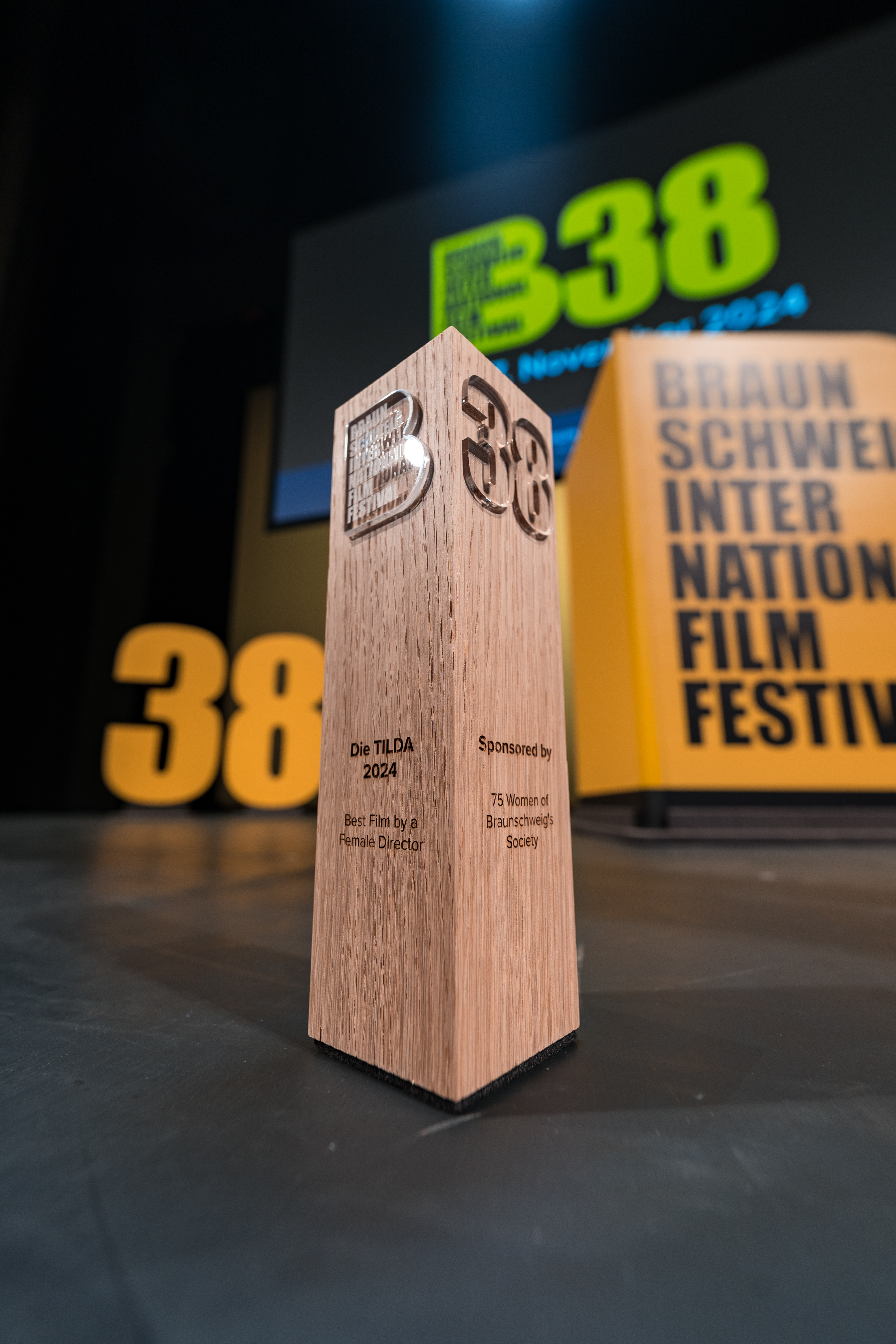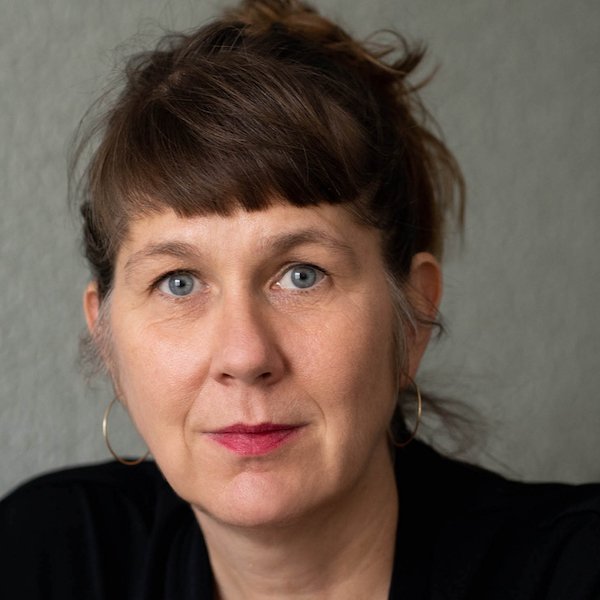TILDA (Best Film by a Female Director)

Since 2019, the Braunschweig International Film Festival has awarded the women's film prize "Die TILDA". Since 2023, this has been endowed with 6,000 euros, donated by 75 female benefactors. Eight international productions are in competition.
The aim of the donors is to make filmmaking women visible in all their diversity. Another important goal of the film award is to encourage female directors who are at the beginning of their careers and whose works do not receive the attention they deserve.

Dominique Ortmann
Founder. Something with culture. Coordinator renovation and refurbishment at the Braunschweigisches Landesmuseum. Archaeologist with focus on prehistory. Sustainability manager. Feminist with a heart for animal welfare dogs and passionate moviegoer.

Canan Turan
Canan Turan is a curator, dramaturge, moderator and podcaster with a focus on anti-discrimination and critique of power in cinema. She is a member of the Berlinale Generation committee and curates the short film program of the Tallgrass Film Festival. She lives in her hometown Berlin.

Marnon Fischer
Marnon Fischer is a committed entrepreneur from Braunschweig who is passionate about the advancement of women. With a clear focus, she supports women in achieving their career goals. Her passion for cinema is reflected in her work, because she is convinced that nothing ventured, nothing gained, and the world needs more women who are willing to take on the leading role!

Sandra Brandl
Sandra Brandl is a freelance film editor. She edits cinema, documentary and feature films. Her work includes THE WHALE AND THE RAVEN by Mirjam Leuze and DIE UNBEUGSAMEN by Torsten Körner, which was the highest-grossing Arthaus film in Germany in 2021. DIE UNBEUGSAMEN 2 can currently be seen in cinemas. As Topos Film, she develops and produces her own films with Mirjam Leuze. She is a member of the German Film Academy and the German Federal Association of Film Editors and has three children.
2023: POWER ALLEY

Directed by: Lillah Halla, Brazil 2023, 99 min.
JURY STATEMENT:
This year's TILDA goes to a film that achieves an amazing balance between a solid script that addresses a controversial but very relevant topic for women around the world, the outstanding performance of a group of young actresses that portrays the diversity of a society in constant movement, a fluent editing that engaged immediately the spectator to the story and a powerful soundtrack that spreads dynamism and enable to empathize even more with the characters.
An excellent assembly leaded by a director in her first feature, which allows us to see through Sofia's eyes how sorority and support from the closer ones is the strength we need to face the unexpected challenges of life.
Congratulations to Lillah Halla for this year's TILDA for her film POWER ALLEY.

Dominique Ortmann
Founder. Something with culture. Coordinator renovation and refurbishment at the Braunschweigisches Landesmuseum. Archaeologist with focus on prehistory. Sustainability manager. Feminist with a heart for animal welfare dogs and passionate moviegoer.

Dr. Gabriele Heinen-Kljajić
Founder, political scientist, long-time cultural politician and former Minister for Science and Culture of Lower Saxony.

Ixchel Coutiño
Born in Mexico City in 1983. Studied at Arte 7 film school in Mexico City. She enters in the cinema in 2007 and since then she has occupied key positions as Production Manager, Line Producer and Executive Producer working in more than 25 films both national and international.

Jutta Feit
Jutta Feit is co-owner of jip film & verleih, an independent women-led film distribution/production company specializing in impact distribution and production. She is a graduate of the Masterclass Non-Fiction of IFS-Cologne, trained Fiction-Producer Filmhaus Köln/Ihk, and EAVE graduate in Marketing. She has worked in the film industry for more than 20 years in various roles.
2022: PINK MOON

Directed by: Floor van der Meulen, Netherlands/Slowenia 2022, 95 min.
At a dinner party, 74-year-old Jan announces to his children that he wants to end his life on his next birthday. Daughter Iris, in particular, reacts with shock and, out of anger and incomprehension for his decision, takes her father to the snowy mountains of Slovenia. She hopes to get answers and also find a way to deal with Jan's wish. The lightly directed drama PINK MOON sensitively and forcefully addresses the right to self-determined and dignified dying. "A film that shows my perception of the world and deals with my greatest fears," says director Floor van der Meulen about her debut.
Biography Director:Floor van der Meulen, born in 1989, studied audiovisual design in Rotterdam and New York. Her documentaries and TV productions have won international awards. PINK MOON is the feature film debut of the director and writer.
JURY-STATEMENT
This year's TILDA goes to a film that manages an unprecedented balancing act between a highly personal narrative and an exploration of a controversial but highly relevant social issue. From the perspective of a daughter whose father announces his intention to take his own life, the director not only stages an emotional and resonant story in which she creates an almost painful intimacy with all the main characters, but also opens up the space for an open-ended reflection on the subject of suicide. At the same time, it allows the film a true-to-life dash of humour and authentic lightness. An excellent ensemble, led by the director with impressive acting, carries this balance as well as flawless and artful camera work and sound design. We congratulate Floor van der Meulen on this year's TILDA for her film PINK MOON.

Sophie Brakemeier
Sophie Brakemeier is a media scholar, film critic and programme coordinator at goEast - Festival of Central and Eastern European Film. Since 2019 she is a permanent member and former editorial director of the project FILMLÖWIN - Das feministische Filmmagazin.

Prof.‘in Dr. Sabine Brombach
Founder, professor at Ostfalia University of Applied Sciences, focus: gender & diversity. Social scientist, women's officer; study projects on the topic: women and girls; education, counselling, coaching. Worked in France, Great Britain, Morocco, Ethiopia, Mongolia, Azerbaijan, Indonesia.

Verena Gräfe-Höft
Verena Gräfe-Höft is a Hamburg-based producer and founder of JUNAFILM. She is a member of the EAVE Producer Network and an alumna of the European TV Drama Labs & Inside Pictures. In 2017 she was chosen by German Films as Producer on the Move in Cannes. In 2019 she won the Producer Award at Filmfest Hamburg.

Dr. Gabriele Heinen-Kljajić
After graduating from high school in the town of Mechernich (1981), Heinen-Kljajić studied political science, German language and literature and sociology at the University of Bonn (MA 1989). In 1990, she became a research assistant at the universities of Gießen, Frankfurt am Main and Jena as part of the Volkswagen Foundation's research project "Arms Control in Western Europe". She served as Minister for Science and Culture of Lower Saxony and is still active in various bodies in the fields of science, culture and education.
2021: HIVE

Directed by: Bierta Basholli, Kosovo/Switzerland/North Macedonia/Albania 2021, 83 min.
Like many women in Kosovo, Fahrije is hoping for news about her husband, who is still missing seven years after the war. Widows are not expected to work, but she has to provide for her family and joins forces with other widows to start a business producing ajvar. This is despite the fact that the community already condemns her for daring to drive! The film was inspired by the true story of Fahrije Hoti. Laura Wilson (Altitude Film): "We were all thrilled with HIVE. It's a beautifully made, deeply thoughtful film that is by turns angry, entertaining, moving and inspiring." At Sundance, the film won the hearts of audiences and juries alike!
Biography Director:Born in Kosovo in 1983. Studied directing in Kosovo and New York. Her feature film debut HIVE was the big winner of Sundance Film Festival, where it won three major awards from jury and audience. Today Basholli is a cultural director in Pristina.
JURY-STATEMENT
Seven years after the end of the war in Kosovo, it is mainly widows who bear the social burden of the losses. Fahrije, like many other women, lost her husband during the Krusha e Madhe massacre. Many of these bodies have never been found. To support each other in finding the missing and grieving, the women have formed an association. In search of a way out of poverty, they begin the commercial production of ajvar. In doing so, they prevail against the opposition of the traditional patriarchal environment. The high level of social control already condemns driving.
Sensitively and intensively, the film accompanies Fahrije and with her the women around her on their way to a growing independence.
This story is based on actual events in the aftermath of the Krusha e Madhe massacre, in which over 200 people were killed and three-quarters of the houses burned down. The film recalls this, but shows what is not conveyed by the news: After years of waiting and searching for the missing, the women must find ways to deal with the unchangeable. This happens undramatically, between pain, resignation, realism, also humor, so that the political can be experienced through the personal.
With this feature debut, Kosovar Blerta Basholli presents a mature work.
- Sabine Brombach, Heike Klippel, Jakobine Motz, Anna Wollner

Anna Wollner
Landed in university radio by chance while studying communication, media and theatre studies in Leipzig. She has been working as a film and series critic for public radio for over 15 years.

Jakobine Motz
She studied camera at the Academy for Film and Television in Potsdam-Babelsberg. Graduated in cinematography in Los Angeles. She works as a cinematographer, editor, film writer and lecturer.

Heike Klippel
Founder, professor of film studies at the Braunschweig University of Fine Arts. Publications on feminist film theory, memory, time, film and everyday life. Last publication: Poisons and Poisoning in Science, Fiction, and Cinema (2017), ed. with B. Wahrig, A. Zechner.

Prof.‘in Dr. Sabine Brombach
Founder, professor at Ostfalia University of Applied Sciences, focus: gender & diversity. Social scientist, women's officer; study projects on the topic: women and girls; education, counselling, coaching. Worked in France, Great Britain, Morocco, Ethiopia, Mongolia, Azerbaijan, Indonesia.
2020: SLALOM

Directed by Charlène Favier, France/Belgium 2020, 92 min.
JURY-STATEMENT
With great empathy, complexity and persuasive power, French director and screen writer Charlène Favier uncovers the malicious mechanisms of abuse in her debut feature SLALOM about a ski instructor and his 15-year old student: the power position of the successful coach who uses a mix of pressure, criticism, praise and favoritism to control the young woman; the insecurity of the adolescent whose absent mother and missing father figure make her susceptible to male recognition so that she seemingly accepts her coach’s transgressions; the presumption that the young woman is partly responsible for her abuse.
But the almost fairytale-like snow scenes reveal what the teenager is truly looking for. Yet, instead of the beauty, harmony and love, she finds herself in an abyss of sexual exploitation which nearly destroys her. When her dream of winning the skiing-race comes true, she feels no happiness, just emptiness. Only then she manages, with the support of her friend and her mother, to dissociate herself from her coach and end the abuse.
Favier’s film stands out through its subtle dramaturgy, its camera work with its closeness to the main character, the remarkable acting performance, and its strong emancipatory message.
2019: LOVEMOBIL

Directed by Elke Margarete Lehrenkrauss, Germany, 103 min.
JURY-STATEMENT
An extraordinary documentary about sex workers in caravans parked on the side of country roads in Lower Saxony. The slow-paced, quiet film offers intimate insights and moments of truth, showing hope, fear, loneliness and desperation in a way that attests to the sensitive, respectful work of the film team with the protagonists over a period of three years. The filmmakers remain invisible and inaudible throughout the film – an usual but convincing choice for a documentary as it leaves the protagonists to tell their own stories.
The focus is on two young women, Milena from Bulgaria and Rita from Nigeria, and the pimp-cum-landlady Uschi. The portrayal of the protagonists as intelligent and dignified individuals with limited life choices stands in harsh contrast to the process of dehumanisation that takes place in the monetary exchange between sex worker and ‘client’.
The film skillfully juxtaposes the cramped space in the caravans with the open countryside around it, the photography with its long takes, precise framing and choice of original images is impressive and the quiet way in which this documentary exposes the depressing daily horrors of prostitution in the German countryside will not be easily forgotten.
A courageous, overwhelming and eye-opening film!

Frauke Kolbmüller
The Leipzig film maker studied film production. As a freelance producer she worked with Desert Film. In 2015 she founded Oma Inge Film in Hamburg, whose third production is SYSTEMSPRENGER. She is a member of the European Film Academy.

Joanna Łapińska
Director of Programming of the Transatlantyk Festival, Member of the European Film Academy. Before, Joanna Łapińska worked for almost 15 years for the New Horizons International Film Festival, since 2007 being the Artistic Director of the festival.



